Chinese Goddesses in Creation Myths and Legends, Religions, and Folklore
Chinese goddesses are the celestial beings who reign supreme in the realms of ancient mythology, legends, religions, and folklore.
They embody virtues of responsibility and righteousness, possessing the extraordinary ability to shape, rule, and bestow blessings upon the universe.
With every graceful gesture, they infuse life into the cosmos and shower divine blessings upon it.
With their awe-inspiring presence and pivotal roles, these goddesses weave an indispensable thread in the rich tapestry of Chinese culture, their influence transcending the bounds of time itself.

Murals of Some Chinese Goddesses inside the Yongle Palace (Built in 1247 — 1358)
Nu Wa — The Creator of Humanity and the Savior of the Sky
Xiwangmu the Queen Mother of the West — Goddess of Kunlun Mountains
Chang Xi or Wang Shu — Goddess of the Moon
Hou Tu — Goddess of Earth and Land
Baihua Xianzi or Hua Shen — Deity of Flowers
Yun Zhongjun — Deity of Clouds
Jiutian Xuannu — Goddess of Military, Magic Art, and Justice
Su Nü — Goddess of Music, Medicine, and Sex
Bixia Yuanjun — Goddess of Mount Tai
E Huang and Nv Ying — Goddesses of Xiang River
Luo Shen — Goddesses of Luo River

Nu Wa — The Creator of Humanity and Savior of the Sky
Nu Wa or Nüwa (女娲) stands as a pivotal figure in Chinese creation myths.
After the world was shaped by Pangu, it remained devoid of life, a pristine and untouched wonder.
And so, Nu Wa, with her divine touch, crafted life from clay. With a gentle breath, her creations sprang to life — humans who could speak and run, creatures fashioned from the earth's embrace. The marvel of her magic drove her to create more, breathing vitality into the nascent world.
She gifted her creations the knowledge of marriage and the art of reproduction, and in some legends, she bestowed upon them the gift of music and dance, teaching humanity to harmonize with the cosmos.
From that moment, Nu Wa was revered as a mother goddess, and her creation blossomed into a harmonious world.

Goddess Nu Wa or Nüwa Creating Human, Painted by Artist Snow Fish.
Yet one fateful day, a gaping chasm tore open the sky, and calamity rained down as the Water God, Gong Gong, hurled Mount Buzhou into chaos.
The very firmament trembled, while eternal fire and deluge devoured life itself.
With the aid of her mystical guardians, Teng She and Bai Xi, Nu Wa valiantly battled the monsters that emerged from this catastrophic upheaval, reclaiming the lives lost.
She vanquished a colossal, magical tortoise that had unleashed a catastrophic flood, severing its legs and using them as pillars to uphold the sky, preventing it from collapsing upon the earth.
She then gathered 36,500 fragments of five-colored stones, forging them into a colossal, enchanting stone that sealed the vast rift in the heavens.
Afterward, peace once again graced the world.

Goddess Nu Wa or Nüwa FIxing the Sky, Painted by Artist Le Xi.
Nu Wa's appearance is portrayed in myriad forms, but most commonly, she is seen as a resplendent being — part woman, part serpent — a symbol of both grace and mystery.
As for her origin and ultimate fate, these remain veiled in enigma.
Over time, Nu Wa came to be regarded as the sister or consort of Fu Xi. They bore four sons, who watched over the four cardinal directions and orchestrated the transition of seasons, shaping both land and sky.
Together, they laid the foundation of an orderly and virtuous society, teaching humankind the fundamental rites that have echoed through the ages.

Goddess Nu Wa or Nüwa, Painted by Artist She Xi.
Xiwangmu the Queen Mother of the West — Goddess of the Sacred Kunlun Mountains
Xiwangmu (西王母), revered as the Queen Mother of the West, is a formidable goddess dwelling beside Yaochi, a mystical lake nestled within the breathtaking landscapes of Mount Kunlun.
This enchanting realm is adorned with resplendent flowers and unique flora, including the legendary Peaches of Immortality.
The Peaches of Immortality, known as Pan Tao in Chinese, grow in a special orchard within her celestial garden, where the peaches ripen only once every three thousand years.
During her grand birthday banquet, she serves these magical peaches, bestowing blessings of immortality and auspiciousness upon her guests.

Peach Festival of the Queen Mother of the West by an Artist from the Ming Dynasty (1368 — 1644)
Initially, Xiwangmu was depicted as a deity with a human's form and the tail of a leopard.
However, over time, she transformed into a beautiful and supreme goddess, presiding over all female deities and safeguarding the elixirs of life that hold the key to immortality.

Xiwangmu the Queen Mother of the West, Painted by Artist Han Dezhu.
Xiwangmu has bestowed her divine blessings upon the mortal realm, dispatching mythical creatures, deities, and sometimes even herself to reward virtuous individuals and aid humanity in the face of calamities and malevolence.
In ancient history, some exceptional emperors who achieved remarkable feats met Xiwangmu or were graced with her blessings.
Notable sovereigns such as the Yellow Emperor, King Yao, King Shun, Yu the Great, King Mu of Zhou, and Emperor Wu of Han were among those who crossed paths with this divine and benevolent deity.

Murals of Xiwangmu the Queen Mother of the West inside the Yongle Palace (Built in 1247 — 1358)
Xi He — Goddess of the Sun
Xi He (羲和), the goddess of the sun, graced various Chinese myths, taking center stage in their celestial tales.
In some renditions, she cradled ten suns as their mother, while in others, she choreographed the sun's elegant ballet across the heavens.
Moreover, Xi He bore the vital duty of observing and inscribing the cosmos' wonders, faithfully maintaining the celestial chronicles and the rhythm of time.
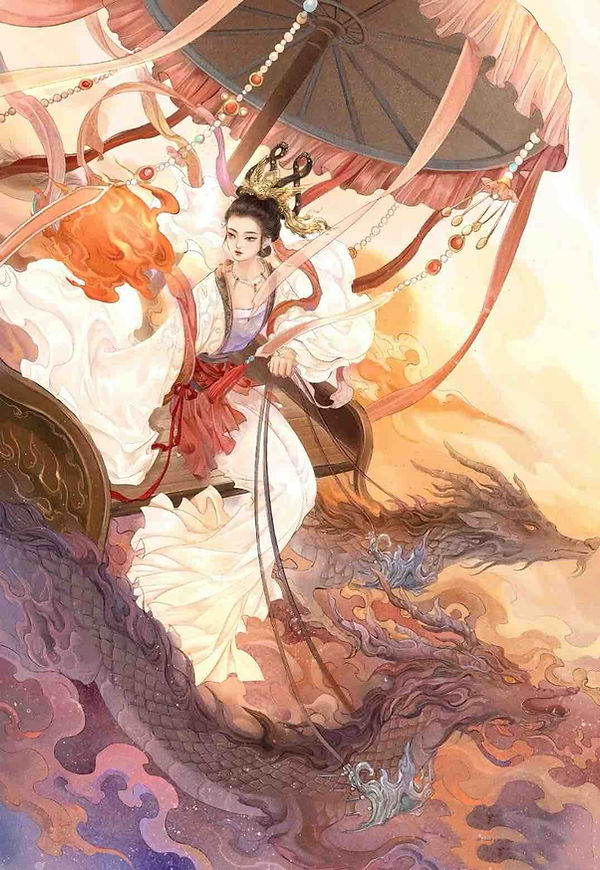
Deity Xi He, Painted by Artist Hua Hua.
Chang Xi or Wang Shu — Goddess of the Moon
Chang Xi and Wang Shu, two revered Moon Goddesses, hold pivotal roles in ancient Chinese mythology.
Chang Xi (常羲) is celebrated as the mother of the 12 moons, symbolizing the year's 12 months.
In certain interpretations, Chang Xi and Xi He, the Sun Goddess, are considered the same deity, responsible for setting the calendar and celestial observation.
Meanwhile, Wang Shu (望舒) guides the moon's celestial journey by driving its celestial cart.
Throughout a tapestry of myths, legends, and folklore, Chang Xi, Wang Shu, and the deity Chang E collectively embody the very essence of the Moon Goddess.
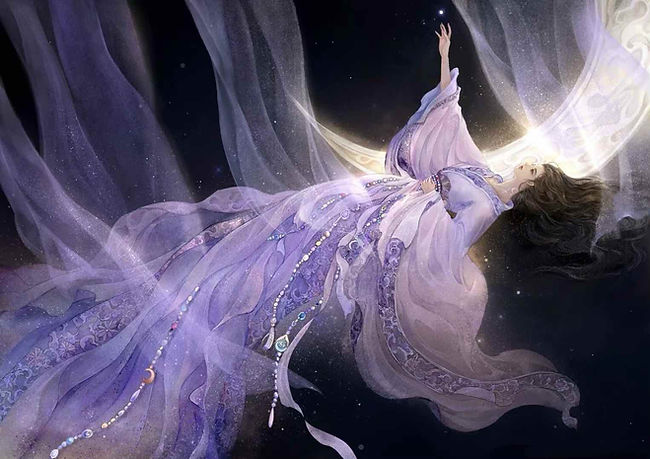
Deity Wang Shu, Painted by Artist Hua Hua.
Hou Tu — Goddess of Earth and Land
Houtu (后土), the revered Earth Goddess in ancient Chinese mythology, stands as the central deity of the land, overseeing the vast and intricate forces of nature.
Her domain spans the majestic mountains, winding rivers, and fertile fields that sustain life.
With a deep connection to fertility and the balance of yin and yang, she governs the cycles of nature, ensuring the beauty and vitality of all living things.
As the nurturer of life, Houtu presides over the earth’s deities, guiding the cycles of birth and growth, from the blossoming of plants to the reproduction of creatures, infusing the world with prosperity.

Murals of Houtu and other Deities inside the Yongle Palace (Built in 1247 — 1358)
In the early days of mythology, Houtu was not defined by a specific gender, but by the Han Dynasty (202 BC — 220 AD), she had evolved into a personified goddess, affectionately known as "Mother Earth."
This transformation reflects the profound respect ancient Chinese people held for the earth as a boundless source of strength and sustenance, recognizing its essential role in their survival and the continuity of life.

Mural of Deities inside the Houtu Temple, Ming Dynasty (1368–1644).
Ancient rituals dedicated to Houtu emerged as expressions of this reverence.
From the Han Dynasty (202 BC — 220 AD) onward, emperors formalized these ceremonies, personally leading rituals to honor her.
These elaborate ceremonies served not only to express gratitude for Houtu’s nurturing spirit but also to seek her blessings for abundant harvests, timely rains, peace, the well-being of the people, and the stability of the state.
In this way, Houtu became a maternal protector, safeguarding the earth and its people, ensuring harmony between the spiritual and the earthly realms.

Baihua Xianzi or Hua Shen — Deity of Flowers
Baihua Xianzi (百花仙子) or Hua Shen (花神) is a revered deity in the heavenly realm, embodying beauty and grace as she fulfills the enchanting role of overseeing all flowers.
Her duties encompass the life cycle of each bloom, from its blossoming to its eventual withering, including its colors, fragrance, and chosen places to flourish.
Known as the "Master of All Flowers," she holds dominion over everything related to flora in both the heavens and the earthly realm.
On the birthday celebration of the Queen Mother of the West, Baihua Xianzi takes it upon herself to enhance the festivities.
She summons celestial birds and mystical beasts to join in honoring the Queen Mother, filling the palace and its grounds with lively, extraordinary splendor.

Birthday Celebration of the Queen Mother of the West, by Artist Zhao Boju from the Southern Song Dynasty (1127 — 1279)
During times of plague on earth, Baihua Xianzi descends with a team of flower spirits, carrying baskets of blooms.
Together, they sing and dance in the air, scattering petals over the land.
The fragrance of the flowers soothes the suffering, revitalizes the earth, and helps people regain their vitality.

Baihua Xianzi or Hua Shen and Heavenly Maidens Scattering Flowers, Painted by Artist Liu Fufang.
Yun Zhongjun — Deity of Clouds
Yun Zhongjun (云中君), a prominent figure in ancient myths and legends, is celebrated as the deity of clouds.
While often regarded as the celestial ruler of the skies, some interpretations suggest this mighty figure embodies a harmonious triad of natural forces: clouds, thunder, and rain—a true master of weather.
In some traditions, Yun Zhongjun is also revered as the guardian of Yunmeng Lake, a mystical and legendary body of water.

Yun Zhongjun the Deity of Clouds, by Artist Liu Danzhai.
Jiutian Xuannu — Goddess of Military, Magic Art, and Justice
Jiutian Xuannu, also known as Jiutian Xuannü (九天玄女), stands as an ancient goddess born from the pristine spirit of the universe.
Initially, she was depicted as a deity with the head of a human and the body of a bird.
However, over time, she transformed into a vision of beauty and grace, embodying wisdom, and holding mastery over the arts of war and magic.
Throughout the annals of history, Jiutian Xuannu has lent her support to numerous righteous emperors and valiant generals, aiding them in their conquests and defense.
Her benevolence takes the form of military strategy books, guidance in wielding magic weapons, and the teachings of ancient mystical arts, ensuring that justice prevails on the battlefield.

Jiutian Xuannu or Jiutian Xuannü, by Miaoxing Jushi.
Su Nü — Goddess of Music, Medicine, and Sex
Su Nü (素女), an ancient goddess, possesses unparalleled mastery in the realms of music, medicine, and the art of lovemaking.
Her musical talents are unparalleled, particularly her virtuosity in playing the ancient instrument known as the Se (瑟).
Her melodies have the unique power to nurture and stir the souls of all who listen.
Su Nü is also renowned as a master of medicine and the sacred art of lovemaking.
During the Han Dynasty (202 BC — 220 AD), a seminal work in the field of sexology was penned, bearing her name, the "Su Nü Jing."
In accordance with myths and legends, Su Nü was the true author of this ancient text, dedicating her wisdom to its pages to instruct and enlighten humankind in the profound aspects of sexual practice, benefiting generations to come.

Su Nü Playing Instrument Se, by Artist Liu Danzhai.
Ma Gu — Deity of Longevity
Ma Gu (麻姑) is an immortal deity often portrayed as a beautiful young maiden.
With her magical abilities, she aids people and crafts divine alcohol to celebrate other deities' birthdays, all throughout her eternal existence as she witnesses the profound transformations on Earth.
Hence, Ma Gu has been a representative of longevity and auspiciousness in Chinese culture, and her birthday greetings are considered highly fortunate, especially for women.
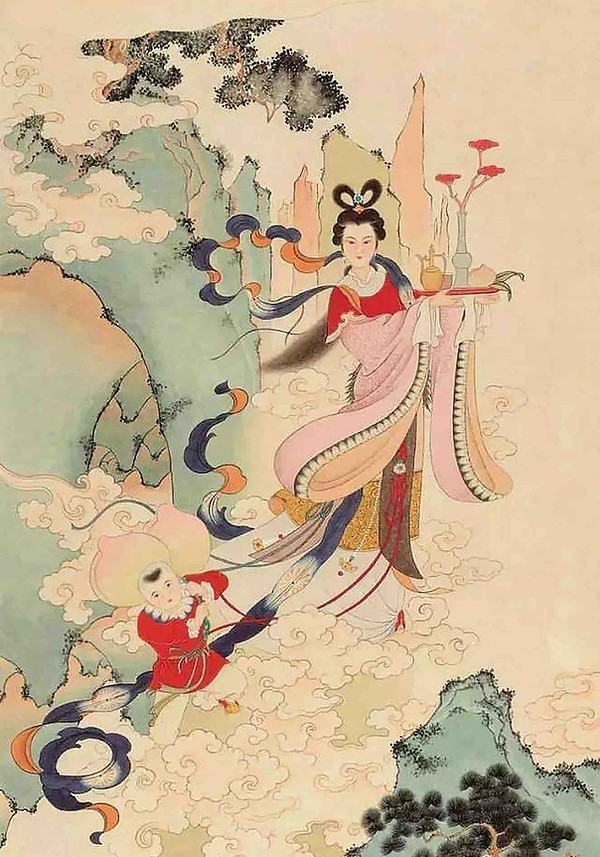
Ma Gu Celebrates Longevity, Painted by Artist Ren Shuaiying.
Bixia Yuanjun — Goddess of Mount Tai
Bixia Yuanjun (碧霞元君) is the goddess who watches over the sacred Mount Tai, one of the most revered places in Chinese culture, with profound cultural and political significance.
Her divine presence safeguards the well-being of those who tread upon this hallowed mountain, showering blessings upon the prayers of the virtuous and gifting sincere couples with the joys of parenthood.

E Huang and Nv Ying — Goddesses of Xiang River
E Huang (娥皇) and Nv Ying (女英), the graceful daughters of Emperor Yao (circa 2377 BC — 2259 BC), and the devoted wives of Emperor Shun (circa 2294 BC — 2184 BC).
These two ethereal beings stood by their husbands in times of adversity, accompanying Emperor Shun on his remarkable journey from humble commoner to the exalted status of the great Emperor Shun.
After Shun passed away during a tour, E Huang and Nv Ying left the world in the Xiang River and were incarnated as Xiang River Goddesses or Goddesses of the Xiang River (湘夫人).

E Huang and Nv Ying the Goddesses of Xiang River, by Artist Han Dezhu.
Luo Shen — Goddesses of Luo River
Luo Shen (洛神) is an exquisitely beautiful deity who became the Goddess of the Luo River after drowning in its waters.
Ever since, she has watched over the river, becoming a muse for countless poets and artists who have immortalized her stunning beauty and poignant love story in their masterpieces.
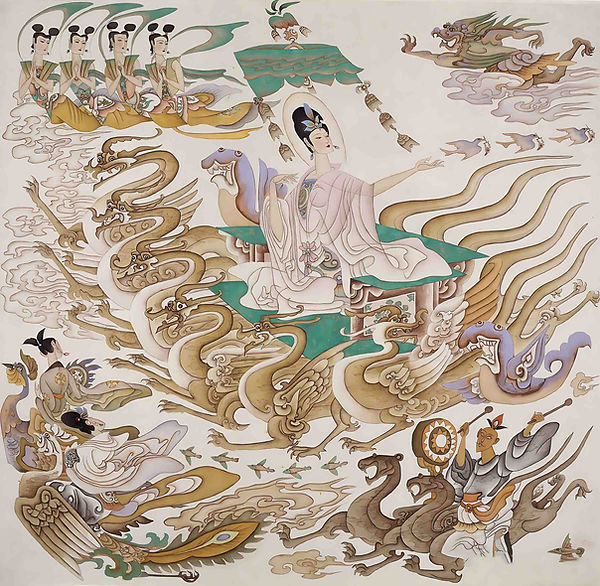
Luo Shen the Goddesses of Luo River, by Artist Chen Quansheng.
Yao Ji — Goddesses of Wu Mountain
Yao Ji (瑶姬) holds vigil over Wu Mountain, a deity whose spirit embodies the legacy of a Flame Emperor's daughter.
Following her earthly journey, her spirit embarked on a celestial odyssey, eventually alighting on the slopes of Wu Mountain, where it took root as a mystical flower.
Through ages of patient observation and the absorption of the universe's essence, she was reborn as a goddess.
Yao Ji stands as a muse frequently celebrated in Chinese literature, praised for her extraordinary beauty, virtuous character, benevolent heart, and her renowned love story with a king of Chu State.
Her story has captured the imagination of poets and authors, ensuring her place among the most cherished figures in the tapestry of Chinese folklore.
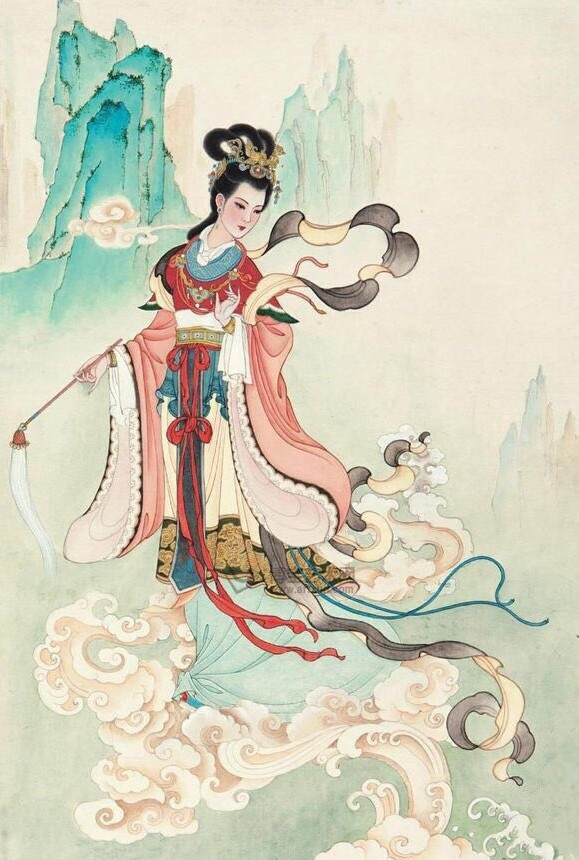
Yao Ji — Goddesses of Wu Mountain, by Artist Ren Ping.
You Might Also Like:
Mythical Beings: Soul, Spirit, Demon, Monster, Ghost, Devil, Deity, and God
Mythical Creatures and Animals in Chinese Mythology, Folklore, and Legends
Mythical Places in Chinese Mythology, Folklore, and Legends
Ancient Creation Myth and Chinese Gods
Mythical Deities in Chinese Mythology, Folklore, and Legends
Chinese Mythology — Origins, Characteristics, Folklore, Legends, and Elements
Chinese Dragon or Loong — History, Power, Utilization, and Culture
The Nine Sons of the Dragon — An Ultimate Guide
Chinese Phoenix Fenghuang — Legend, History, Utilization, and Culture
The Five Types of the Fenghuang — Legends, Symbolism, and Influence
The Nine Sons of the Chinese Phoenix Fenghuang — An Ultimate Guide
Qilin — Mythical Creature of Benevolence, Strength, and Auspiciousness
Nine-Tailed Fox, Huli Jing, and Fox Spirit in Chinese Culture
Prehistoric Heroes and Apotheosized Kings
Yin Yang and Taiji — Origin, Meaning, Symbol, and Utilization
Chinese Zodiac Signs — A Comprehensive Introduction
Chinese Astrology — Three Enclosures, Four Symbols, Twenty-eight Lunar Mansions
